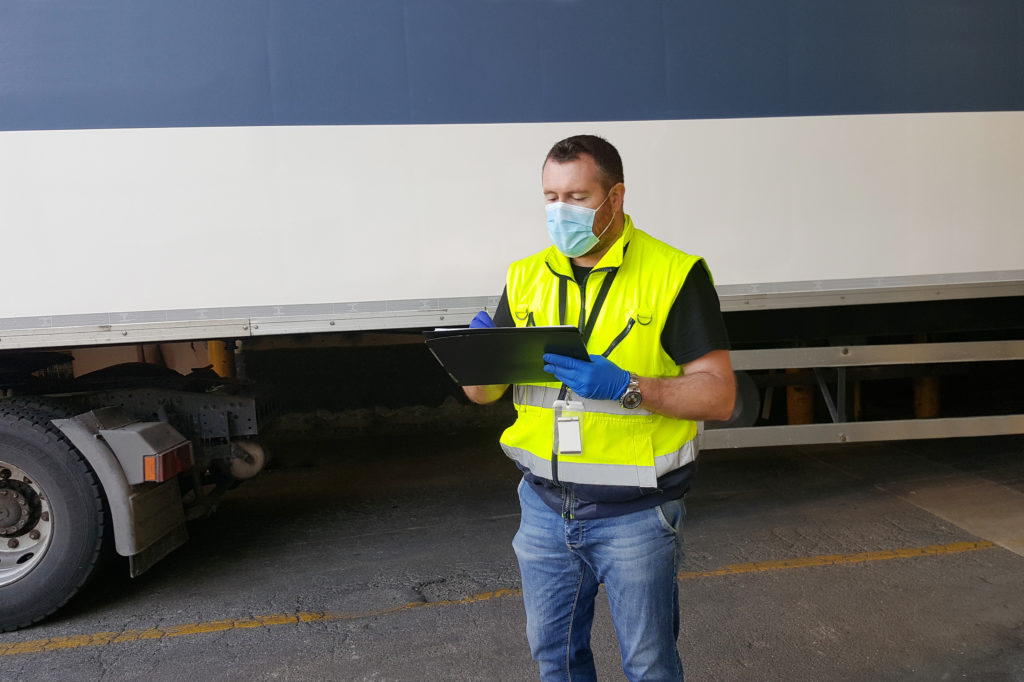
America’s truck drivers are still going above and beyond, serving on the front lines of the coronavirus pandemic to keep our grocery stores, homes, and hospitals stocked with the essentials we need.
We’ve reported on how many individuals, businesses, and institutions across the country are showing their gratitude toward truckers–some offering them free meals, beverages, services, and discounts during this time. That gratitude is still going strong, as is the hashtag, #ThankATrucker.
“Happy #TruckerTuesday!” said Bestpass Inc in a tweet. “Huge shout out to the Chicago Skyway–toll collectors are handing out snack bags to those who pass through the toll plaza.” The free snack bags, given throughout the month of May, will include drawings made by SCC employees’ families, bottled water, healthy snacks, and sweet treats.
“With increased demand for food and goods during these unprecedented times, truckers are struggling to navigate long hauls with closed rest stops,” said Fernando Redondo, CEO Of Skyway. “We hope these snack bags serve as a small token of the Skyway’s gratitude to America’s truckers for moving the goods that keep our country moving.”
Oregon Trucking jumped on the gratitude bandwagon as well with a tweet, saying: “We’re coming to Central Oregon on Wednesday! Drivers: get your free lunch, water, a mask, and sanitizer,” along with the hashtags #MealsForDrivers and #ThankATrucker.
@TruckingFWD tweeted an article describing 10 different ways people can thank and support truck drivers. The ideas included: paying for a trucker’s coffee while they are stopped at a gas station; giving truckers care packages with water, snacks, and hand sanitizer; giving drivers a thumbs up when seeing them on the road; leaving delivery drivers thank-notes on your front door; and more.
One particularly heartwarming story that gained attention on Twitter was that of a kindergartener in Niskayuna, New York, who wanted to take his family’s gratitude for truckers to the next level.
“We watch the FedEx, UPS, and USPS trucks on our street every day, and I explained to Jack that delivery drivers were working extra hard during quarantine because people can’t go shopping often,” Amanda Mahar said of her son. “We decided to leave them a ‘thank you’ sign and some snacks outside our doorstep, but Jack took it a step further.”
Jack’s idea was to set up his very own refreshment stand in front of his house with an assortment of goodies for truck drivers.
“While I was inside making dinner, Jack set up the ‘stand’ at the end of our driveway,” said Mahar. “He brought the snacks down, his toy tractor, and his folding chair. He put on his FedEx hat and sat himself down. I looked out the window and couldn’t believe it. He sat for a full hour waiting for our first stop–from UPS–who was making deliveries on our street.”
Jack would offer all truckers stopping by a complimentary snack and a drink, and some drivers gave Jack a special peek into their trucks and posed for pictures with him.
“Jack is committed to keeping the drivers fueled and has already talked about the different items we can offer each day,” said his mom. “So, I think we can count on making this a daily part of our quarantine.”
NEW Cooperative expressed its gratitude for the Lenz grandchildren in Palmer, Iowa, who have been waving at the company’s semi trucks as they drive by. Earlier in May, the kids “delivered donuts to say ‘Thank You’ to the semi drivers! #ThankATrucker,” said NEW Cooperative in a tweet.
Kenworth Trucking Co. also recalled a memory of gratitude: “When I unloaded a pallet of vegetables, customers at the store stopped and applauded,” one trucker from the company explained on Twitter. “That was something I won’t forget. We’ve been seeing an outpouring of support for what we do. We’re all in this together.”
In Myrtle Creek, Oregon, volunteers at the town’s Elks Lodge hosted a “We Heart Truckers” community event, which included goody bags filled with face masks, snacks, and thank-you notes. Lodge members even baked homemade cookies to include in the gift bags.
“My husband is a long haul trucker,” said Elks Lodge member Jessica Elst. “He was in Texas, and they wouldn’t let him in to drop off his load without a face mask, so he had to literally cut the sleeve off of his shirt to put over his face before they would let him in.”
Additionally, Nebraska State Patrol troopers made an effort to distribute almost 100,000 face masks to truck drivers throughout the state.
“This was a tremendous effort by many people to primarily do two things: show our thanks and support to these drivers, and to help protect them as they continue working to keep food and critical supplies moving across the country,” said Superintendent of the Nebraska State Patrol, Colonel John Bolduc. “Our troopers have a great relationship with the Nebraska Trucking Association. To partner with them and federal agencies to make this happen quickly is a good example of the teamwork we’re seeing all over the country right now.”




